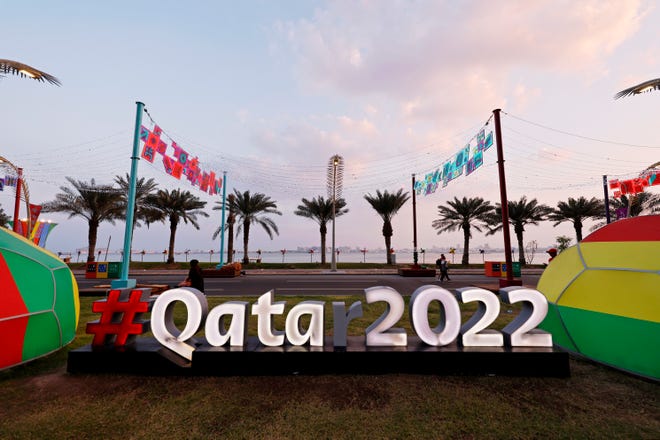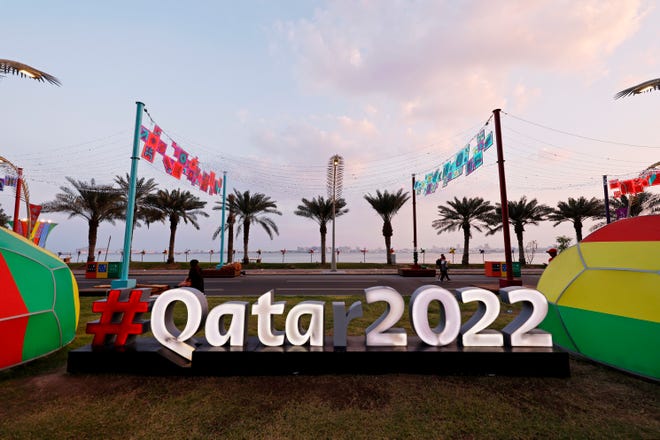Don’t even think about it, International Olympic Committee.
There will come a day, not long from now, when Qatari officials will make their case that the success of this World Cup has shown Doha to be a worthy host of a Summer Olympics. Possibly as early as 2036. They will tout the dazzling World Cup stadiums, first-class training facilities and the efficient metro system that whisked fans between games. They will show photos of those smiling fans, celebrating their teams, mingling in the Souq Waqif or strolling along the Corniche as Doha’s skyline glitters in the background.
They will remind the IOC that a Middle Eastern country has never hosted an Olympics, and point to the unfairness of excluding a region with more than 400 million people. It will be a compelling argument and one sure to tempt IOC president Thomas Bach, great statesman that he fancies himself to be.
Do it, and the Games will never recover.
“If Qatar does a 180-degree change and becomes the lead in the Middle East and the Muslim world for the affirmation of gay rights, and starts giving citizenship to migrant workers and starts paying them, it might be a different ballgame. But based on this World Cup, no,” said Bruce Kidd, a professor emeritus of sport policy at the University of Toronto.
“How do you put human rights back in the bottle?” Kidd, who ran for Canada at the 1964 Olympics in Tokyo, added. “How do you put LGBTQIA++ rights back in the bottle?”
You can’t. Nor should you. Which is why the IOC cannot be swayed by a Doha bid or the promises that will come with it.

As it has shown with this World Cup, Qatar is eager to have the world over for a party while also insisting everyone abide by house rules. Rules that are, by their very nature, exclusionary and discriminatory, and in direct contradiction to all the Olympics supposedly stand for.
Despite progress in the treatment of migrant workers, there is still resistance to a compensation fund for those who died or were injured, along with doubts about whether the reforms will hold or be abandoned once the PR is no longer needed.
Despite promises that everyone was welcome in a country where homosexuality is illegal, LGBTQ fans were harassed by security forces, who became increasingly heavy-handed about displays of pride or allyship. FIFA took the unprecedented step of threatening European captains with on-field discipline if they wore rainbow armbands.
Despite assurances it would respect free speech, Iranian fans had banners and T-shirts showing support for protesters back home confiscated. Despite claims of respect, women were treated like second-class citizens, made to go through separate security lines at the media center and some stadiums.
MORE:Three keys for Argentina and France to win 2022 World Cup final
WORLD CUP:Everything you need to know
OPINION:Lionel Messi’s World Cup dream remains alive
All this runs counter to the IOC’s own Strategic Framework on Human Rights, which was approved in September.
“The IOC expects potential future hosts to describe how they will seek to identify and address adverse human rights impacts, in line with the (United Nations Guiding Principles on Business and Human Rights), throughout the lifecycle of and within the remit of the Olympic Games,” the framework says. “In addition, the IOC commissions a high-level independent assessment of the human rights situation in the potential future host country to help inform the selection process.”
And unlike before this World Cup, Qatar can’t be given the benefit of the doubt it will actually do what it says it will. Because it’s shown, repeatedly, that it won’t.
Promises to FIFA, sponsors, fans – nothing was sacrosanct. FIFA wasn’t a partner so much as a puppet, albeit a willing one, and there is no reason to expect Qatar would see the IOC any differently.
“I can’t say this with absolute certainty, but I’d be very surprised if athlete leadership didn’t insist on written guarantees before bids are even decided, given what we saw in the World Cup,” Kidd said. “I just can’t believe this would happen again.”
Had Qatar played the long game during this World Cup, it probably would have improved its Olympic chances.
Doha meets many of the criteria spelled out in “Winning the Olympic host city election: key success factors,” a paper published in December 2016 by Wolfgang Maennig and Christopher Vierhaus, economists at the University of Hamburg.
The IOC likes to rotate among continents, and the Middle East has never had an Olympics. The IOC rewards persistence, and Doha’s previous three bids – for 2016, 2020 and 2032 – were flatly rejected. The IOC goes to places that have hosted world championships, and Doha did for both gymnastics (2018) and track and field (2019).
The IOC also looks favorably on bids from cities that recently hosted or are about to host a World Cup, figuring the facilities and infrastructure built for one can be used for the other.
“There are good arguments for it: there are stadiums available, there is a certain competence in organizing,” Maennig said. “We don’t know why, but we see the empirical fact that it may help the chances to organize an event, and it may help the chances to get the second event.”
And yet …
The perception of this World Cup is overwhelmingly negative in many European countries, Maennig said, and that’s where nearly half of IOC members are from. Sponsors saw how little regard Qatar had for contracts and longstanding relationships, forcing FIFA to throw Budweiser under the bus two days before the World Cup began. The notion that this World Cup is environmentally friendly, let alone carbon neutral, is laughable.
While he hates to make judgments without empirical data, Maennig said, “My guess is right now the IOC would lose a lot of money and good reputations if they would give it to Qatar.”
Olympic athletes have become more and more vocal about equity and human rights in recent years, and that’s only going to increase over the next decade. Ditto for the number of out LGBTQ athletes. To think they would allow themselves to be silenced or shamed so as not to offend Qatar’s tender sensibilities is as absurd as it would be offensive.
The IOC has willingly compromised its principles before, taking the Games to both Russia and China in the last eight years. But the IOC’s own rules make that harder now. Allowing Doha to host a Summer Games wouldn’t just require the IOC to compromise itself, it would compromise the Olympics themselves.
Doha simply isn’t worth it.
Follow USA TODAY Sports columnist Nancy Armour on Twitter @nrarmour.








